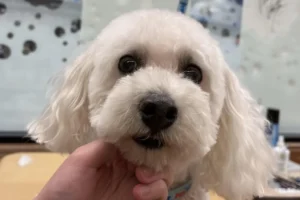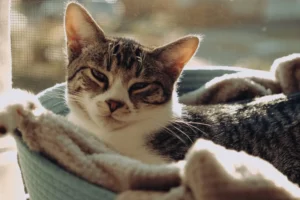Cats are known for their fastidious grooming habits, but when you notice your feline friend spending an excessive amount of time licking her private area, it might raise some concerns. So, why does your cat keep licking her private area?
Licking their private areas is a common grooming behavior for cats, but it can also indicate underlying issues that need attention. Here’s a closer look at why your cat might be focusing on her nether regions and what you can do to help.
Normal Grooming Behavior
Cats are meticulous groomers, spending a significant amount of time each day licking themselves to keep clean and maintain their fur. This grooming behavior is completely normal and serves several purposes, including regulating body temperature and distributing natural oils throughout the fur for a healthy sheen. When it comes to grooming their private areas, cats are just ensuring that all parts of their body are kept fresh and clean.
Another important reason cats groom themselves is to remove any dirt, debris, or potential parasites that may be present on their body. So, if you notice your cat licking her private area, don’t worry too much—it’s likely just a part of her regular grooming routine. However, if this behavior becomes excessive or obsessive, it may be worth examining further for underlying issues.
Medical Reasons
While it’s normal for cats to groom their private areas, excessive licking in this area can sometimes indicate an underlying medical issue that needs attention. One common problem that can cause increased grooming in this area is a urinary tract infection. Cats with UTIs may experience discomfort or pain when urinating, leading them to try to alleviate the discomfort by licking excessively.
Allergies can also be a culprit behind your cat’s frequent licking in her private area. Instead of trying to solve this issue on your own, it’s important to consult with your veterinarian to identify the root cause of the behavior and develop an appropriate treatment plan. Before you know it, your furry friend will be feeling much better and back to her normal grooming routine.
Behavioral Causes
Is your feline friend constantly grooming her private area? This behavior could stem from behavioral causes like stress or boredom. Cats are known to lick excessively when they are feeling anxious or unsettled. If there have been recent changes in your household or routine, your cat may be seeking comfort through grooming.
Moreover, boredom can also lead to overgrooming. Cats are intelligent creatures that require mental stimulation and playtime to keep them engaged. If they are not sufficiently entertained, they may resort to excessive grooming as a way to fill the void. Make sure to provide plenty of toys, scratching posts, and interactive play sessions to keep your cat happy and occupied.
If you suspect that stress or boredom is causing your cat to lick her private area excessively, try to identify and alleviate the underlying issues. Provide a calm and stable environment for your cat, offer plenty of enrichment opportunities, and make time for bonding activities to help reduce her need for overgrooming. Remember, a happy cat is a healthy cat!
Environmental Factors
Changes in your cat’s environment can play a significant role in her grooming habits, particularly when it comes to her private area. Have you recently introduced a new pet into the household? Has there been a shift in your living situation or routine? These environmental factors could be triggering your cat’s excessive licking behavior.
It’s essential to create a secure and harmonious environment for your cat to thrive. Ensure that she has access to her favorite resting spots, a clean litter box, and a consistent feeding schedule. Introducing new pets should be done gradually to minimize stress for your feline companion. Providing her with a sense of security and stability can help reduce her need to overgroom.
Additionally, consider the hygiene of your cat’s private area. Regular grooming and monitoring can help prevent any potential skin issues or infections. If you notice any abnormalities during your cat’s grooming sessions, consult your veterinarian for further evaluation and guidance.
Unique Insight:
Keeping a journal of your cat’s grooming habits can provide valuable insights into her behavior. Note the frequency and duration of her licking sessions, any triggers or stressors that may be present, and any changes in her environment. This information can help you pinpoint patterns and potential causes for her overgrooming. By being proactive and observant, you can better support your cat’s well-being and address any underlying issues promptly.
Stress and Anxiety
If your cat keeps licking her private area excessively, it could be a sign of stress or anxiety. Cats may groom themselves more when they feel anxious or have changes in their environment. To help your feline friend feel more at ease, create a cozy and comfortable space for her to retreat to when she needs a break. Providing interactive toys, regular playtime, and a consistent daily routine can also help reduce stress levels. Additionally, consider using pheromone diffusers or calming supplements to promote relaxation.
Age and Hormonal Changes
As cats age or undergo hormonal changes, such as being spayed or neutered, their grooming habits may shift. Older cats may develop arthritis or other health issues that make it challenging to groom properly, leading to increased licking in the genital area. It’s essential to monitor your cat’s grooming behavior and consult with your veterinarian if you notice any changes. They can provide guidance on managing age-related concerns and offer solutions to support your cat’s grooming needs.
Unique Insight:
Regular grooming sessions can help older cats who struggle to groom themselves adequately. Use a soft brush to gently comb through your cat’s fur, focusing on areas that are hard for them to reach. This not only helps maintain their hygiene but also strengthens your bond with them through gentle, loving care.
Consulting Your Veterinarian
If you notice your cat licking her private area excessively, it’s crucial to consult your veterinarian right away. This behavior could indicate a potential health issue that needs professional attention. Your vet can conduct a thorough examination to determine the root cause of this behavior and provide appropriate treatment.
Fun Fact: Cats Spend Up to 50% of Their Waking Hours Grooming Themselves
Did you know that cats can spend up to 50% of their waking hours grooming themselves? This not only helps them keep clean but also serves as a way to regulate body temperature and maintain their appearance. So, the next time you see your feline friend indulging in a grooming session, know that it’s a natural and essential behavior for their overall well-being.
As a unique insight, consider that excessive licking of the private area in cats could also be a sign of stress or anxiety. Just like humans, cats can exhibit grooming behaviors as a way to cope with feelings of unease or tension. If you suspect your cat’s grooming habits are related to emotional distress, creating a calm and secure environment for them can help alleviate the issue.
Remember, your cat’s health and happiness should always be a top priority. By staying attentive to changes in their behavior and seeking guidance from a professional, you can ensure your feline companion receives the care and support they need.
Alex, a passionate animal lover, has experience in training and understanding animal behavior. As a proud pet parent to two dogs and three cats, he founded AnimalReport.net to share insights from animal experts and expand his knowledge of the animal kingdom.









